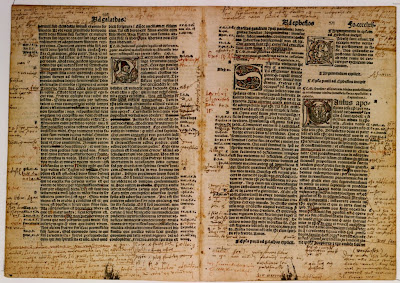I'm posting this from a Russian blogsite, translated into English for readers:
Catalogue of Old English revision of the Bible
Posted on July 7, 2010
 | |
| Click to Enlarge |
by Dr. Teol. Dony K. Donev
Aldhelm (639-709) was the first author staroanglisyki translation of the Psalms.
Kedmon mentioned by Bidi is the author of Old English songs with biblical themes.
Reverend Bidi translated the Gospel according to John in the English shortly before his death in 735, the
Vespasiyanskia interlinearen gloss is Psalm of Psalms, written around 850, of mersianski dialect.
Edvinskiyat Psalter Kanabara and 10 other gloss on the Psalms, dating from the ninth century, have reached today.
Around 900, King Alfred ordered translation and transcription of many biblical texts such as the Ten Commandments, parts of the Pentateuch and Psalms. It is assumed that the translation us in Psalms Paris Psalter was made by order of King Alfred.
Between 950-970, the, Alfdred added gloss written in nortambskiya staroanglisyki dialect.
At the same time, a monk named Pharma gloss wrote the Gospel according to Matthew, which is still preserved in a manuscript known as Rashuartskoto gospel.
Around 990, theAppears Tetraevangelia full translation of the West Saxon dialect, known today as Veseksko gospel.
At the same time dorsetshirskiyat monk Alfrik end independent translation of the Pentateuch books accompanied by Joshua and Judges.
Kedmonskite manuscripts are written in the period 700-1000, theand contain biblical texts speak English language.
(apologies: autotranslated from Russian online)
mr.scrivener

Great info!
ReplyDeleteHere's a tiny bit more translation:
Kelfrid = Ceolfrid
Alkuin = Alcuin/Ealhwine
Kedmon = Cædmon (Kedmonskite = Cædmonian)
Alfrik = Ælfric
Edvinskiyat Psalter Kanabara = Eadwine's Canterbury Psalter
"Phar gloss" - Farman
A lot of this info overlaps with the Wikipedia page on Old English Bible translations.
It's actually Bulgarian, not Russian.
ReplyDeleteI could translate in English if interested
Thanks,
The Author